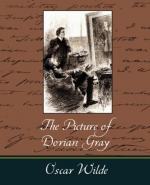|
|
The Picture of Dorian Gray Topic Tracking: Beauty
Chapter 1
Beauty 1: Basil and Lord Henry's discussion reveals their beliefs about beauty: Lord Henry finds that it is the most important thing, whereas Basil, although he appreciates Dorian's beauty, finds that he would not want to be beautiful himself. One has to pay for being beautiful, or even intelligent; he says that the ugly and stupid people have it the best in the world.
Chapter 2
Beauty 2: The first time we hear of someone being forgiven for acting badly because they are beautiful is when Lord Henry assures Dorian that his Aunt Agatha could not possibly stay mad at him, because she is so enamored with his beauty. It is impossible to see evil in a beautiful face. Lord Henry's first impression of him is that he looks so good, and so pure, that he isn't surprised that Basil has such an affection for Dorian.
Beauty 3: Lord Henry is the first to impress upon Dorian the idea that his beauty is what will get him things in life, and the idea that his beauty will also fade with age. He issues a warning to Dorian that he had better live out his dreams now, when he is young, beautiful, and can do no wrong in the eyes of the world. Dorian is not quite aware of the effect his looks have on the people around him, but Lord Henry tells him that someday he will be ugly, and he will understand what Lord Henry is talking about.
Beauty 4: Dorian awakens to the reality of his own beauty for the first time when he sees Basil's portrait of him, and at the same instant is struck by what Lord Henry has told him. He is beautiful now, but when he ages he will no longer be beautiful. He realizes how important beauty is, and that he would be willing to give anything to keep it. Though he had previously been unaware of his beauty, he realizes it now as the most important thing he possesses. Beauty is more important, in fact, than his soul.
Chapter 7
Beauty 5: Beauty and character are directly connected for the first time when Dorian sees the changes in the portrait; previously the effects of age on a beautiful face have been discussed, as has the effect that beauty has on one's perceived character, but here we see that Dorian's actions have made the portrait appear a little cruel, and a little less beautiful. Wilde refers to the painting as a mirror, for it shows Dorian's face as it has been affected by his character.
Chapter 8
Beauty 6: We see a bit more into Dorian's vanity here: his chief motivation for becoming good, for doing the right thing, is his beauty. The choice of words is important; he doesn't say that he doesn't want his soul to be evil, or corrupt, he says he does not want it to be hideous. The thing he is most afraid of is that people will see that he is evil.
Chapter 10
Beauty 7: Dorian decides to hide the portrait so no one will see that it has changed; he is clearly subscribing to Lord Henry's view that beauty and youth are the most important things, because even though he has resolved not to commit any more sins, he knows that the portrait will be ruined by age anyway. A good character cannot make a beautiful face; only youth can, and he has made his choice to keep his youth no matter what.
Chapter 11
Beauty 8: The way that society judges Dorian is not based on his character but on his looks; good looks can create a perceived good character, and that is as far as most people think to look. In spite of the rumors being passed about, whenever Dorian meets someone face to face, they cannot help but love him.
Beauty 9: We discover that goodness and beauty are not necessarily linked; quite the opposite. Dorian comes to think of evil in terms of how beautiful it is, and over the years commits evil simply for the poetic beauty of doing so. He believes, and this is mainly due to Lord Henry's preaching about hedonism, that doing things simply for the sake of adding pleasure to his life also adds an element of beauty.
Chapter 16
Beauty 10: Beauty has let Dorian down. He needs to escape from it and acquire something that no expensive jewel or piece of art can give him, which is reality. This is one reason why he goes to the opium den; there is an ugliness there that far surpasses anything he might find in high society; the beauty in high society is false, whereas the ugliness that takes place in the opium dens, where people are desperate and their lives have been ruined, is completely real.
Chapter 20
Beauty 11: Looking back on his life, Dorian sees that Lord Henry was wrong about beauty; it is not the most important thing, and had he not awakened to his beauty that one afternoon in Basil's studio, he might not have gone down the path of ruin that he did. Youth and beauty are overrated, and he wishes that he could have had a good life rather than one filled with artificial art and beauty. He acknowledges that it was due to his own vain prayer that the portrait bear the burden of age and sin, and deeply regrets having made such a wish. There is no way to undo the effects of age on a beautiful face, just as there is no way to undo the effects of sin on a soul, and Dorian now realizes that the latter is the more important.




